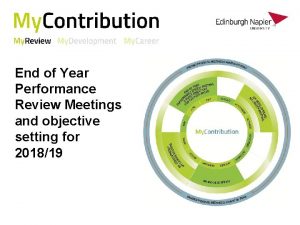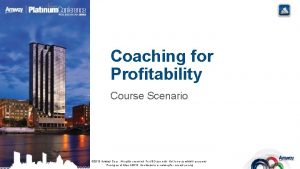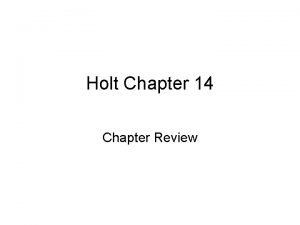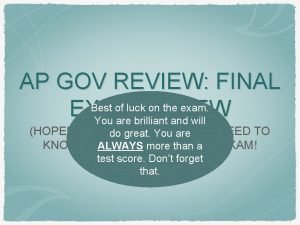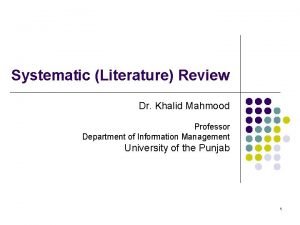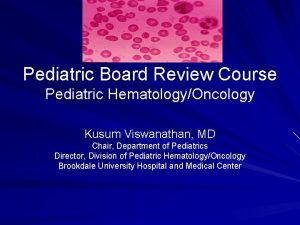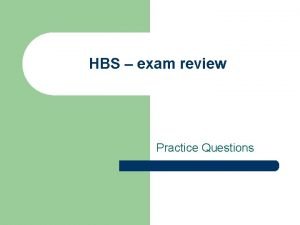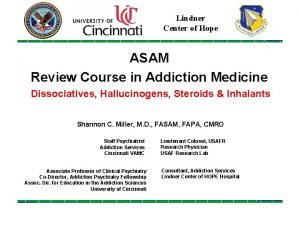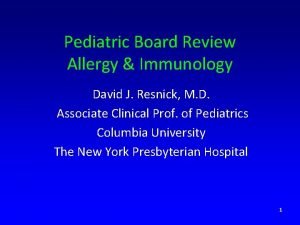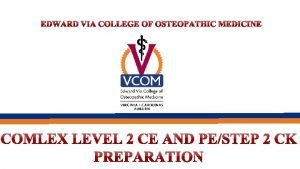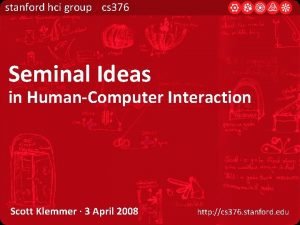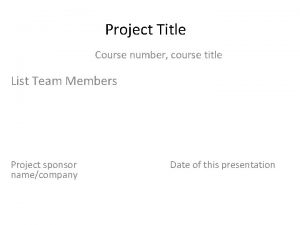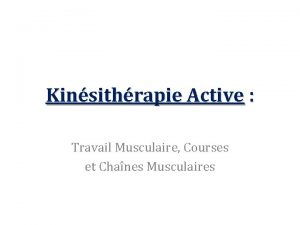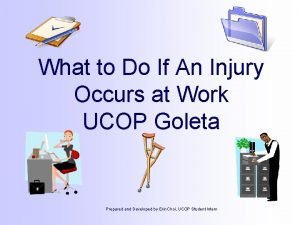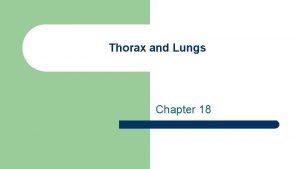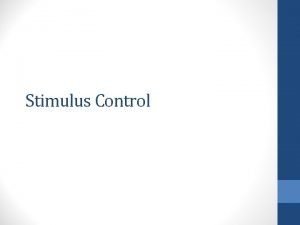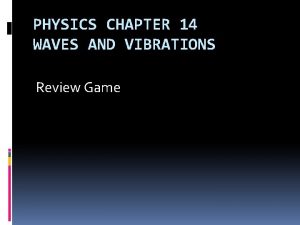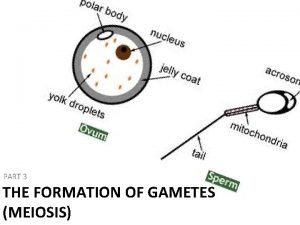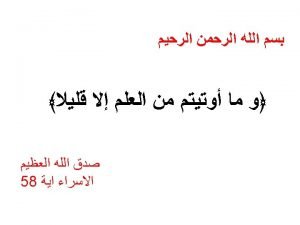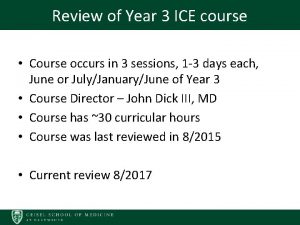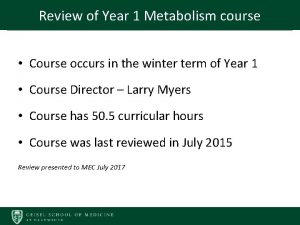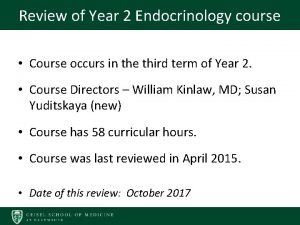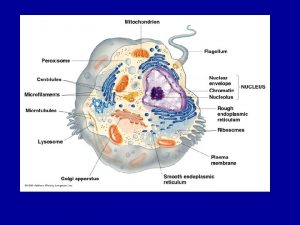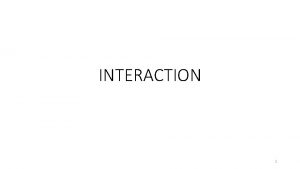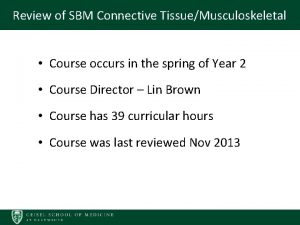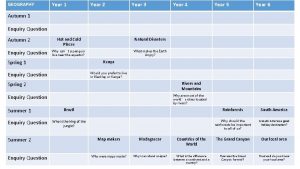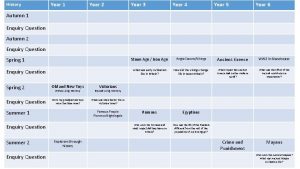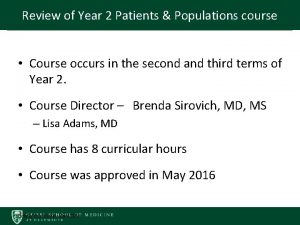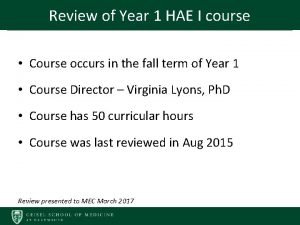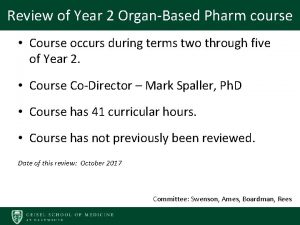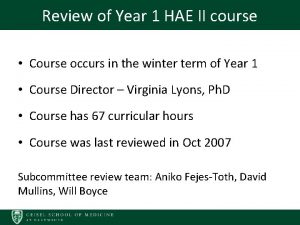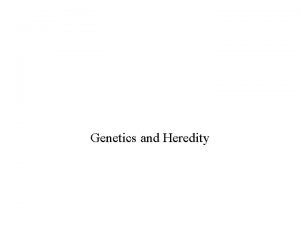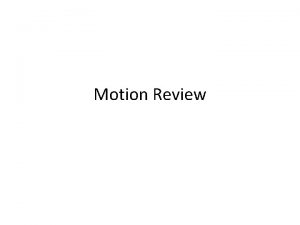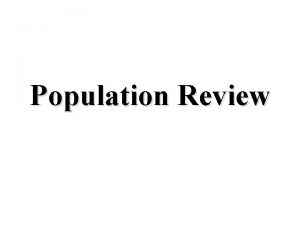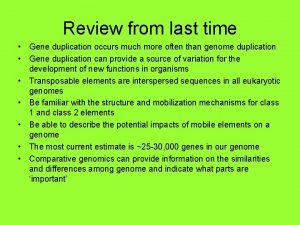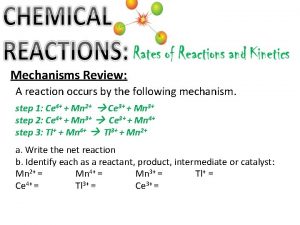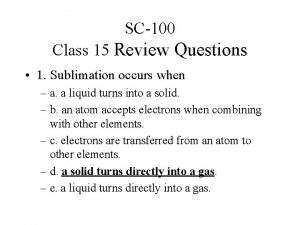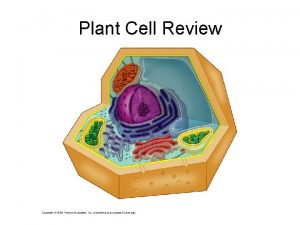Review of Year 2 KidneyUrinary course Course occurs


















![Measures of Quality – Course Evaluation scale [1=poor; 2=fair; 3=good; 4=very good; 5=excellent] SBM Measures of Quality – Course Evaluation scale [1=poor; 2=fair; 3=good; 4=very good; 5=excellent] SBM](https://slidetodoc.com/presentation_image_h/198a1aeb5bad29d833e93ec7e4a704e9/image-19.jpg)












- Slides: 31

Review of Year 2 Kidney/Urinary course • Course occurs in the third term of Year 2. • Course Director – Thomas Kaneko, MD • Course has 53 curricular hours. • Course was last reviewed in Nov 2013. Date of this review: June 2017

Action Plan from Prior Review Issue Proposed Solution Several faculty members missed their sessions. Calendar system at DHMC was having problems. Reporting will be performed differently in the future. The section’s schedule has been proactively designed with the course in mind. Course objectives need to better reflect what is being taught across all six competency domains. All course learning objectives were rewritten. Course contains 57% lecture time. Student presentations will expand to 2 hours. Some traditional lectures will be converted into labs and interactive large group sessions. Each course learning objective needs to be Instructors will be given parameters for assessed in an appropriate manner. writing new exam questions.

Course Objectives 1 Describe the normal structure and physiology of the renal/urinary system 2 Describe the pathophysiology of disorders of salt and water balance, and how these disorders are diagnosed and treated 3 Describe the pathophysiology of disorders of common tubular and interstitial diseases, and how these disorders are diagnosed and treated 4 Describe the pathophysiology of major glomerular diseases, and how these disorders are diagnosed and treated 5 Describe the pathophysiology of disorders of sodium balance, and how these disorders are diagnosed and treated 6 Describe the pathophysiology of disorders acid-base balance, and how these disorders are diagnosed and treated 7 Describe the pathophysiology of common disorders of potassium balance, and how these disorders are diagnosed and treated 8 Describe the pathophysiology of common causes of acute renal injury, and how these disorders are diagnosed and treated 9 Describe the pathophysiology of major causes of chronic renal insufficiency and ESRD, and how these disorders are diagnosed and treated, including hemodialysis and renal transplantation 10 Describe the most common tumors of the urinary system, and how they are diagnosed and treated 11 Describe the most common inherited renal diseases, their clinical genetics, how they present, and how they are treated 12 Describe that pathophysiology of urinary stone disease, and how stones can be treated and prevented 13 Describe the pathologic findings of common renal and urinary diseases

Course Objectives - Continued 14 Describe the basic pharmacology, indications, and side effects of drugs commonly used to treat renal diseases 15 Describe the ways that physicians can clinically assess renal function (e. g. perform a urinalysis, compute an estimate of creatinine clearance) 16 Develop your ability to develop a good differential diagnosis for common presentations of renal disease 17 Communicate clearly with other healthcare professionals about renal disease 18 Model how you would explain to patients their therapeutic options for common kidney diseases 19 Demonstrate that you are a punctual, well prepared, and active participant in your team learning activities 20 Describe the medical ethics implications of several common renal diseases, such as decisions related to renal transplantation, and decisions related to going on (or ceasing) HD 21 Demonstrate your ability to find, read, and analyze scientific articles that describe evidence-based optimal therapy for common renal disorders 22 Describe how a healthcare system like Medicare makes its decisions about paying for the care of all patients with end-state renal disease

Mapping of Course Objectives to Geisel Competencies • Course director will review current mapping (to new Geisel competencies) and forward updates to Brian Reid

Course Objectives – Comments • Course objectives are sufficiently detailed and capture course content well

Format of Course & Session Objectives • Course objectives are provided in the syllabus • Course objectives are written in the correct format • Session objectives are provided in the course materials • Session objectives are generally written in the correct format – A few use verbs such as “understand”

Issues of Redundancy • Are there major issues of redundancy with other courses? – Course includes some planned repetition with Renal Physiology in year 1, which most students identify as helpful rather than repetitive – Many faculty teach in both courses, which helps with integration – Students identified some overlap with diabetes material in Endocrine course that may benefit from coordination

Health and Values Goals Ethics – “Identify key concepts in health care ethics and demonstrate an ability to recognize ethical issues arising in patient care and population health and to think critically and systematically in applying an ethical analysis” Cultural Awareness – “Demonstrate an understanding and skill in managing patient care of people of diverse cultures, social, economic standing and belief systems” Health Equity – “Identify the root causes and approaches for addressing health disparities locally and globally” Resilience – Demonstrate knowledge of skills and practices to prevent and address stress and maintain resilience in caring for patients and oneself Compassion and Empathy – “Demonstrate abilities to understand each patient’s experience of illness, adapt scientifically appropriate care to conform to that patient’s needs, and communicate in terms that each patient can understand” There also are synergies to health law, communication skills, professionalism (as LCME requires).

Health and Values Content • What Health and Values Program material (healthcare ethics, cultural awareness, health equity, resilience, compassionate care) is presented in the course? – – Transplantation Socioeconomic history of dialysis Renal replacement therapy patient panel Psychology of Illness session on Haiti • Affected by technical difficulties this year; to be revised • Health and Values topics are noted in the course and session objectives • Student evaluations of these sessions are mixed

Nutrition Content • Nutrition VIG have indicated to us that they are not quite ready to start participating in course reviews

Summary regarding Objectives • Course objectives seem appropriate to course content and are correctly written • Course includes some planned repetition with year 1 renal physiology, which students generally find helpful • Many faculty teach in both year 1 Renal Physiology and year 2 SBM FEK, assisting with integration/coordination • Course director will review diabetes material in SBM Endocrine that may overlap with FEK course to ensure coordination

Course Learning Opportunities • • • Lecture 24 hrs. (45. 3%) Interactive Large Group 4. 5 hrs. (8. 5%) Patient Contact 3. 5 hrs. (6. 6%) Conferences 15 hrs. (28. 3%) Laboratory 2 hrs. (3. 8%) Final Exam 4 hrs. (7. 6%) 15 -16 Hours: 24 Lecture hrs; 6. 5 ILG hrs; Patient Contact 3. 5 hrs; Conference 13 hrs; Lab 3 hrs; Exam 4 hrs; Total 54 hrs (MEC requested that 1 hr be eliminated to offset addition of Y 2 P&P – hour was eliminated in AY 16 -17)

Summary regarding Pedagogy • Course uses a variety of pedagogic strategies • Students had high marks for many of the lectures • Students requested more small groups for some difficult topics • Pathology material in this course was better received by students than in many other SBM courses – Can we use this to inform other courses?

Assessment • Students must pass both a Final Exam and the Engagement portion of the course. • Attend Renal Replacement Therapy: Dialysis • Attend Renal POI Rounds • Score at least 9 points for the following activities: – 5 small group sessions (attendance and participation worth 2 points for each session) – Renal Replacement Therapy: Dialysis (1 point for attendance) – Renal POI Rounds (1 point for attendance)

Summary regarding Assessment • Exam was overall highly rated by students as testing concepts rather than memorization, although was challenging – Students were concerned that practice questions did not match difficulty of actual exam • All objectives are able to be assessed through a combination of the final exam and small group conferences

Measures of Quality – Step I 2014* 2015* 2016* Means 14 -16 Behavioral sciences 0. 15 -0. 1 -0. 43 -0. 13 Behavioral Health and Nervous system 0. 06 -0. 10 -0. 18 -0. 07 Biostatistics, Epidemiology, Pop Health 0. 01 0. 22 N/A 0. 12 (14 -15) Cardiovascular system 0. 02 0. 16 -0. 1 0. 03 Endocrine system 0. 39 0. 24 0. 09 0. 24 Gastrointestinal system 0. 54 0. 2 0. 06 0. 27 Hematopoietic/lymph systems 0. 09 0. 10 -0. 15 0. 01 Immune system 0. 16 -0. 07 -0. 02 Musculoskeletal, skin, CT systems -0. 02 0. 22 0. 15 0. 12 Nutrition 0. 22 -0. 08 -0. 15 -0. 003 Renal/urinary system 0. 23 0. 02 -0. 27 -0. 007 Reproductive system 0. 39 -0. 03 -0. 04 0. 11 Respiratory system 0. 18 0. 27 -0. 22 0. 08 SYSTEMS-BASED TOPICS *values reported for core disciplines are SD above the US/Can mean for Geisel mean scores

Measures of Quality – Course Evaluation Measures of Quality – AAMC GQ Year 2 courses Overall Quality AY 15 -16 Overall Quality AY 16 -17 Cardiology 3. 69 3. 90 CT & Bone 3. 23 3. 46 Dermatology 3. 89 3. 84 Endocrine 3. 88 3. 67 FEK 3. 85 3. 97 GI 4. 31 4. 45 Hematology 4. 26 4. 44 Infectious diseases 4. 02 Introduction to Pharmacology 3. 74 4. 03 Introduction to SBM Themes 3. 35 3. 43 Nervous system 3. 06 3. 40 On Doctoring 3. 60 Psychiatry 4. 16 Reproduction 3. 05 Respiration 4. 08 scale [1=poor; 2=fair; 3=good; 4=very good; 5=excellent] 3. 63 4. 27
![Measures of Quality Course Evaluation scale 1poor 2fair 3good 4very good 5excellent SBM Measures of Quality – Course Evaluation scale [1=poor; 2=fair; 3=good; 4=very good; 5=excellent] SBM](https://slidetodoc.com/presentation_image_h/198a1aeb5bad29d833e93ec7e4a704e9/image-19.jpg)
Measures of Quality – Course Evaluation scale [1=poor; 2=fair; 3=good; 4=very good; 5=excellent] SBM 212 AY 14 -15 (92. 5%)* SBM 212 AY 15 -16 (91. 2%)* SBM 212 AY 16 -17 (98. 9%)* Overall satisfaction of course 4. 19 3. 85 3. 97 Clarity of learning objectives 4. 07 3. 93 4. 22 Organization of the course 4. 04 3. 78 4. 01 How well the course introduced me to this discipline 4. 34 3. 98 4. 14 Congruence of assessment questions to material emphasized in course 4. 03 3. 70 3. 99 *student participation rate on course evaluation

Measures of Quality – Student Comments Strengths: • Conferences and small group answer keys • Well organized course • Lectures good and clear “lectures (especially those of Dr. Kaneko) were extremely well organized and conveyed, providing us with engaging explanations for material inside of class and a clear template of slides/key points for reference afterwards. “ • Pathology component strong • Challenging but good and relevant exam “exam was well written and thought out. I appreciated the testing of concepts rather than straight memorization. I also thought pathology was well taught and the pathology lab was well run. “

Measures of Quality – Student Comments Strengths: • Dialysis of patient panel, socioeconomic history of dialysis “keep the socioeconomic hx of dialysis section, and strongly encourage students to go. I thought this was one of the most engaging lectures of the year. ” • Review session and notes provided early

Measures of Quality – Student Comments Suggestions for Improvement: • Adjust Haiti session: Technical difficulties, unclear objectives, offensive and ethically questionable ”session with the group in Haiti fell short. Good intentions but disorganized and not clear what we were supposed to get out of that. ” ”video that Dr. Remillard posted prior to the Haiti session was graphic and I did not think included the appropriate contextual information for those images. It leaves people with an image of Haiti that is distorted and without context and I found it ethically questionable…tech difficulties were very frustrating and really took away from the value of the presentation. “ “Students were not prepared or engaged to dialogue with Haitians. ” “lecture concluded with a music video, but the intention behind showing the video was unclear…several students were confused about the speaker's message…unsure if it was supposed to be a social comment on global health and were questioning if this was an appropriate venue for such commentary. ”

Measures of Quality – Student Comments Suggestions for Improvement: • Kidney stone disease, Chronic Kidney Disease, Acute Kidney Injury lectures “lecture on stones and CKD were weak -- stones especially” “For CKD and AKI, it would have been more helpful if the material was presented in diagnostic algorithm format” • FEK and Endocrinology redundancy with diabetes • Practice final should be more representative of final • More practice questions and problem sets “I would hope that more practice in problems similar in scope and difficulty to those seen on the exam would have been helpful throughout the course. “ • More small groups for topics that come later in the course as these are more complicated topics

Summary regarding Measures of Quality • Organization, overall lecture quality, pathology sessions, and exam quality are all highly rated by students • Students identified problems with Haiti session that are being addressed prior to next year’s course • Students request that more practice exam questions be provided and that these match the actual exam in format and difficulty

Recommendations • Revise Psychology of Illness session on Haiti with input from Health and Values VIG • Add more practice questions and ensure they are similar in format and difficulty to final exam • Consider adding a few questions to small group problem sets to address topics not currently covered in small group • Coordinate diabetes material with SBM Endocrine • Continue to coordinate closely with year 1 Renal Physiology course to optimize integration of material and avoid scheduling conflicts

Action Plan • Revise Psychology of Illness session on Haiti with input from Health and Values VIG – Dr. Kaneko will review the Po. I session with Dr. Remillard to create a more directed and focused session with time for Q&A rather than a primary Q&A format. The music video from the 2017 course year will be removed. • Add more practice questions and ensure they are similar in format and difficulty to final exam – Dr. Kaneko will ask lecturers for 2 -4 new exam questions per hour of lecture. Some questions will be incorporated into an updated exam and others into an updated practice exam.

Action Plan • Consider adding a few questions to small group problem sets to address topics not currently covered in small group – Dr. Kaneko will review the current small group sessions to see if additional topics are needed. Several of the later session lectures are not tested material (e. g. the Renal Replacement Therapy patient panel, Socioeconomic History of Dialysis, Psychology of Illness) and do not lend themselves well to small group formats.

Action Plan • Coordinate diabetes material with SBM Endocrine – Dr. Kaneko will review SBM Endocrine material, focusing on the diabetes lecture as this is the area of greatest overlap. We will also state in the lectures that, while some material may be repeated from other courses, it is generally done so because of the importance of the material. As an example, diabetes is an enormous health issue that impacts multiple organ systems and specialties. Repeated review of the material is justified given its importance and impact on every physician’s practice.

Action Plan • Continue to coordinate closely with year 1 Renal Physiology course to optimize integration of material and avoid scheduling conflicts – This is an ongoing process and will continue to be so. Many of the scheduling conflicts encountered in the 2016 -2017 year will be avoided by the anticipated time shift for the year 1 Renal Physiology course for 2017 -2018.

Additional MEC Action Plan • Dr. Kaneko to review material and feedback on Stone, CKD, and AKI lectures and work with speakers to improve these • Consider removal of Objective 1: “Describe the normal structure and physiology of the renal/urinary system” • Consider changing Objective 21 from: – Demonstrate your ability to find, read, and analyze scientific articles that describe evidence-based optimal therapy for common renal disorders – To: Demonstrate your ability to find and read scientific articles that describe evidence-based optimal therapy for common renal disorders

Additional MEC Action Plan • Include wording in Objectives to ensure themes are all captured (pathology, genetics, neoplasia are captured nicely; nutrition, imaging, and pediatrics are not captured in course objectives currently) – For example, Objectives 2 through 9 updated as follows for Objective 2: "Describe the pathophysiology of disorders of salt and water balance in all age groups, and how these disorders are diagnosed and treated, including dietary therapies – For example, Objective 13 updated as follows: Describe the pathologic findings of common renal and urinary diseases" could be changed to "Describe the pathologic and imaging findings of common renal and urinary diseases
 Astronomical event that occurs twice a year
Astronomical event that occurs twice a year Year 6 leavers 2020
Year 6 leavers 2020 Mid year budget review
Mid year budget review End of year review objectives
End of year review objectives Amway fast track incentive 2021
Amway fast track incentive 2021 Mid year budget review
Mid year budget review Chapter review motion part a vocabulary review answer key
Chapter review motion part a vocabulary review answer key Ap gov final review
Ap gov final review Narrative review vs systematic review
Narrative review vs systematic review Example of inclusion and exclusion criteria
Example of inclusion and exclusion criteria Narrative review vs systematic review
Narrative review vs systematic review Hematology oncology board review course
Hematology oncology board review course Hbs eoc practice test
Hbs eoc practice test Dr henry lindner
Dr henry lindner California regulatory review course
California regulatory review course Allergy board review course
Allergy board review course Comlex level 2 ce
Comlex level 2 ce Stanford hci group
Stanford hci group Half brick wall in stretcher bond report
Half brick wall in stretcher bond report Course number and title
Course number and title Chaine parallèle muscle
Chaine parallèle muscle Work occurs when
Work occurs when When a serious customer injury occurs
When a serious customer injury occurs Increase tactile fremitus
Increase tactile fremitus How to determine if a single replacement reaction occurs
How to determine if a single replacement reaction occurs What is stimuli
What is stimuli Gas exchange lungs
Gas exchange lungs Refraction occurs
Refraction occurs The law of reflection states
The law of reflection states Etc occurs in
Etc occurs in Tetrad
Tetrad Saltatory conduction occurs in
Saltatory conduction occurs in



